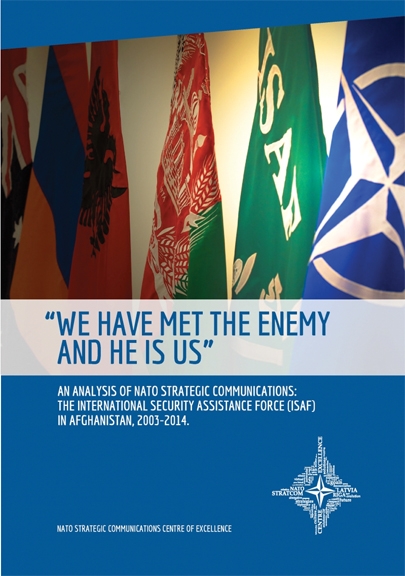”We Have Met the Enemy and He is Us”
by Brett Boudreau
415 pages • ISBN: 978-9934-8582-2-2
Donald Trump has just been sworn in as President, and his unscripted comments about NATO and other alliances have many panicking. Russian troops are at war in the Ukraine, and they are rattling their sabre at Lithuania, Estonia and Latvia. Canada currently has a large contingent of troops on NATO operations in both the Ukraine and Latvia. In Latvia, the Canadians form the nucleus of the battle group, at the Adazi military base. Most analysts believe that NATO is as relevant today as it was when it was formed in 1949. Brett Boudreau, is a former Canadian senior military officer who served in the top echelons at NATO. His important, impressive and timely book “We Have Met the Enemy and He is Us”, examines the strategic communications used by NATO powers during the 2003-2014 Afghanistan campaign. The book is a must read for defence and foreign affairs experts, analysts and academics who can get a thorough and complete study of the communications side of a modern day military campaign. Boudreau is candid that at NATO there are discussions and policy choices made every day during military operations, and that military people often disagree. He examines the process and interaction that happens with strategic communications at the policy option stage and policy choice stage. He reviews the operational execution and the strategic communications that were important components of the International Security Assistance Force (ISAF) campaign. Large parts of his narrative are dedicated, in some detail, to the strategic communications at NATO Headquarters, and chronicle the ISAF mission command by command with an accuracy that can often only be found in the discipline of a military organization. The most refreshing and insightful parts of the book are when Boudreau describes the conflicting views between NATO members and other nations about whether strategic communications is a process, mindset, capability – or a combination of the three – the answer to which, he says affects doctrine, structure and resources. Boudreau’s willingness to cite the successes, the inadequacies, and at times, the failures in NATO’s strategic communications is refreshing and gives this book special credibility. There are also important lessons here for the NATO officials, foreign service officers, military officers and others who are dealing today, with the crisis in the Ukraine, and Latvia. Boudreau’s work validates the argument that a solid and reasoned communications policy, with structure and objectives, goes a long way in shaping opinions.
Read the full book at http://www.stratcomcoe.org/we-have-met-enemy-and-he-us-analysis-nato-strategic-communications-international-security-assistance

